
Director Shin Su-won’s Madonna is a stark and disturbing parable of extreme class inequality, rich versus poor, and society’s increasing lack of value for human life. At the New York Korean Film Festival, Director Shin explained how the sight of a young homeless woman inspired her latest work.
Dig it!
Madonna
Shin Su-won
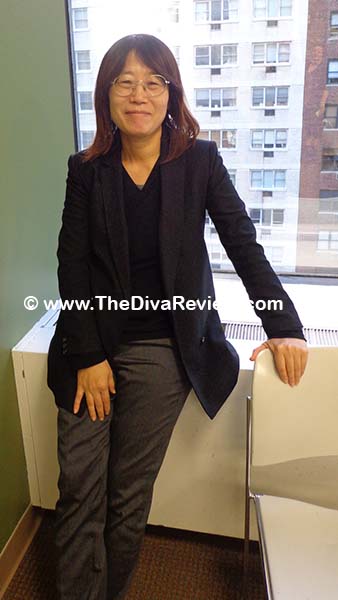 The
Lady Miz Diva: I’m curious about the crafting of the Madonna story and
screenplay. I felt like you could’ve easily made two different films
from the material, but you mesh them so well & unexpectedly. Did you
always envision it as one story?
The
Lady Miz Diva: I’m curious about the crafting of the Madonna story and
screenplay. I felt like you could’ve easily made two different films
from the material, but you mesh them so well & unexpectedly. Did you
always envision it as one story?
Shin Su-won: Madonna actually started from one story, but it sort of divided into two. When it first started, I started with the title VIP Hospital Wing; this is a hospital where people in positions of power would go into these specialised places. I wanted to talk about a man whose life was unnecessarily being extended because of money and power. So, I was conceiving a story about {the character} Kim Cheol-oh {The Chairman}, and his son, Sang-woo, and the nurse’s aide who’s in that hospital. I wanted to sort of criticise the current trend in Korea, where people try to use human life as a means to gain money and power. I was writing that, but it wasn’t as interesting when I just started with that story alone, but then while I was writing, I thought, ‘I think we need an organ donor for a heart transplant for Cheol-oh.’ So I thought it would be interesting if they obtained a donor illegally. That was the first inspiration that I had.
When I was screenwriting, I was actually in a café and right across from me I saw this young homeless woman. She must’ve come into the café to avoid being assaulted or sexually assaulted. The first question that came to mind when I saw her was, ‘How did she hit such rock-bottom?’ She was a lovely looking girl. So that’s when my imagination started to flow and I thought of the character of Mina, and started to imagine how would she come to where she is at right now?
As Mina came into the story, that’s when the story sort of shifted focus from the hospital to the relationship between the characters Hye-rim and Mina. The two women gained more precedence in the story and also I was envisioning Mina to be a chubbier girl and that’s why she was nicknamed Madonna. So the title changed from VIP Hospital Wing to Madonna, and the focus of the story also shifted. Like you just said, that’s probably where you saw these two stories intertwining together, but they do come together in a sense that they ask a question about the importance of human life.
LMD: The things that happen to Jang Mina are horrible and brutal, even though you present it with restraint on screen. How did you determine how graphically or gruesomely you would depict her torment?
SS-w: One thing I promised with the actor who played Mina {Kwon So-hyun} was that she did not want any nudity in the film. Also because there were such emotionally intense scenes, I was naturally concerned about them. So one thing that I really took care of when we were filming was the assault scenes. I’ve always felt uncomfortable about assault scenes that have very close-up shots of the human body. I felt that with that, it feels more like entertainment rather than something that’s gruesome or horrifying, so I intentionally used wider shots. I wanted viewers to view these assaults with compassion and not as sort of entertainment. That was something that I really intended. I also wanted the wider shots to have the effect where audiences would be looking at that and also feel that, ‘Oh my God, we are idly standing by while this is happening.’ This was also another effect that I wanted to achieve.
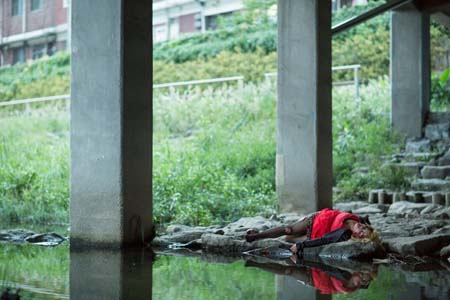 LMD:
I admit I began to lose patience with Mina after a while. Seeing her
being so wretched and be exploited over and over eventually made me just
want to shake her. Was there any thought to the possibility that Mina
was so pathetic and had so many hardships one after the other that
audiences would lose sympathy for her?
LMD:
I admit I began to lose patience with Mina after a while. Seeing her
being so wretched and be exploited over and over eventually made me just
want to shake her. Was there any thought to the possibility that Mina
was so pathetic and had so many hardships one after the other that
audiences would lose sympathy for her?
SS-w: Of course I had concerns about that. {Laughs} But the story that I wanted to tell with this was of story of a human being who was utterly, completely thrown away like a piece of trash. I do believe that sometimes there are people in this world, who, no matter what, some people cannot be saved. They just keep on. And so when you think of the first scene with Mina, she looks as if she’s thrown away somewhere; she’s just lying down in a desolate place.
When I was conceiving the story for Mina and imagining how she could hit this sort of rock-bottom for herself, I sort of imagined that the world just keeps knocking her down continuously without fail. It just keeps knocking her down. And she lives in a world where if you don’t have as much self-esteem, or if you’re not as strong, you just plummet with that. Also, because the homeless girl that I saw in the café left such a strong impression on me, I think those two things came together, as well.
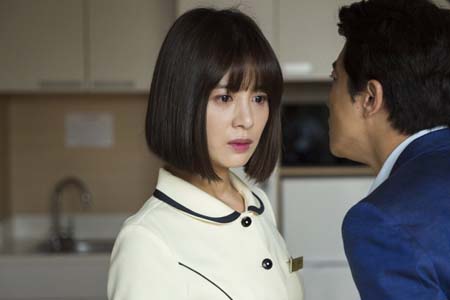 LMD:
Madonna is a very unconventional film in that the movie doesn’t really
have any winners. The doctors are prepared to do the opposite of their
Hippocratic Oath by killing a girl and her baby. The comatose old
Chairman was a bad dad to his illegitimate son. The son is a
sociopath. Our main protagonist commits an unspeakable crime, and our
main victim is a pathetic prostitute.
LMD:
Madonna is a very unconventional film in that the movie doesn’t really
have any winners. The doctors are prepared to do the opposite of their
Hippocratic Oath by killing a girl and her baby. The comatose old
Chairman was a bad dad to his illegitimate son. The son is a
sociopath. Our main protagonist commits an unspeakable crime, and our
main victim is a pathetic prostitute.
SS-w: I feel like in real life, there is never a strict dichotomy of good and evil. But I feel that the current state of humanity, if I’m allowed to say, is that more and more people are driven to come closer to evil forces. People are more willing to betray a friend in order to gain profit. People are more willing to kill for their own desires. We’re continually being driven toward ‘Get what you want, your desires, your greed.’ We’re more pushed towards that direction. I think I wanted to express that also through Mina and Hye-rim, in that even these two people who are the main characters in the film, they also are not exempt from the state of humanity that we live in today.
LMD: What were your instructions and preparations for your actors? There’s not a lot of dialog and most of their thoughts are expressed through their eyes. What were your notes for the two main actresses?
SS-w: I basically told the actors, “Show me with your eyes.” {Laughs} Eye contact! {Laughs} “Tell us with your eyes.”
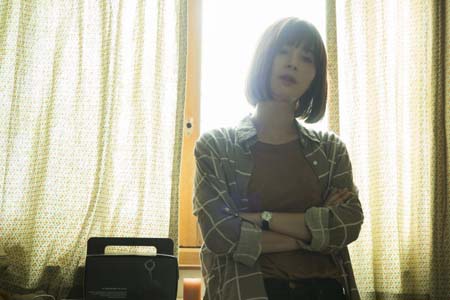 LMD:
What I think is so effective about that technique is you the way you
pose Hye-rim, who stands as an observer of the proceedings as the
audience does, but she is also a participant.
LMD:
What I think is so effective about that technique is you the way you
pose Hye-rim, who stands as an observer of the proceedings as the
audience does, but she is also a participant.
SS-w: That’s a very keen observation you made. At first, I conceived of Hye-rim to be more of a narrator, because she investigates the past of this woman called Mina. At first, the role of the narrator, I thought that was the bigger role for Hye-rim, but while I was in the screenwriting process, I thought, no, I don’t just want her to be the narrator. I felt Hye-rim is just another Mina in a sense, because yes, they’ve led different lives, but I felt that they stood on the same plane in that they come together almost like twins to represent the lives that certain women are living right now.
So while I was to focus on that aspect, I think that’s where you felt that Hye-rim starts to actively go into the story as a character. But also I wanted to maintain her voice is a narrator, because I thought if she maintained that voice, I thought the audience would sort of relate to the character of Hye-rim more as an observer of the story. I think absolutely I wanted to have those two elements come together.
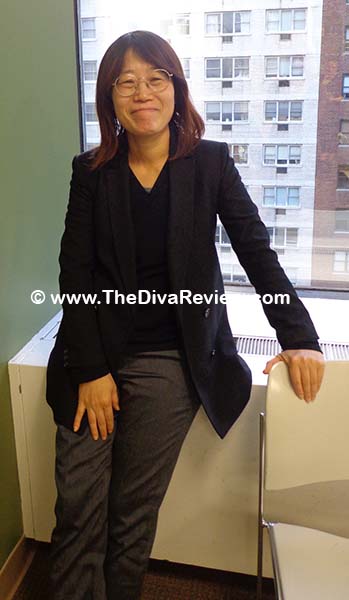 LMD:
Each of your films carries a message of some sort, whether its class
inequality, school pressure or the social hierarchy between men and
women, it is part of your desire as a filmmaker to address issues that
are of note to you?
LMD:
Each of your films carries a message of some sort, whether its class
inequality, school pressure or the social hierarchy between men and
women, it is part of your desire as a filmmaker to address issues that
are of note to you?
SS-w: It’s not a conscious choice I make, when you see the social messages in my films, but it is true that I am interested in these themes. But one of the hardships of being interested in these social commentary themes is that investors are not willing to invest in my films. So, my next film is actually going to be about nature - that deals with a certain forest. So, I guess there will be a certain social message there, as well, but it will not be as intense as you saw in this film, Madonna. I’m not completely opposed to making a film that has no critical viewpoint in it, but as I said, I feel that these are themes that I’m interested in and then actually seep in through my films. I also feel like not just films with messages in them, but I feel that maybe one day in the future, I will be able to create a film that has a very personal story in it.
~ The Lady Miz Diva
Nov. 9th, 2015
© 2006-2022 The Diva Review.com
|
|














